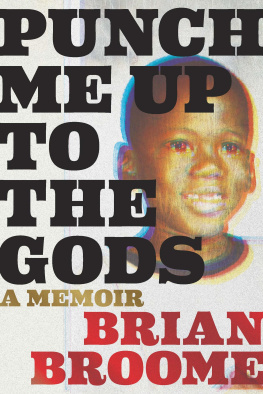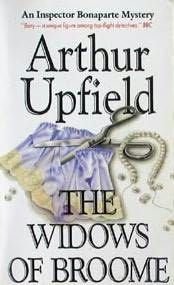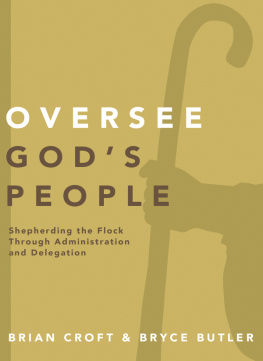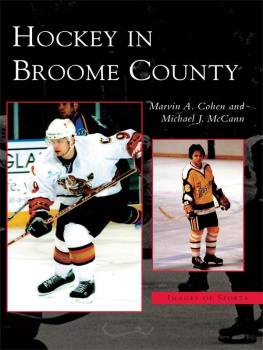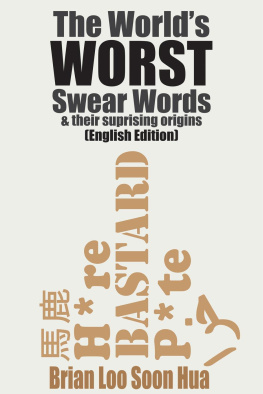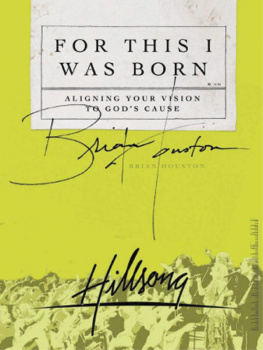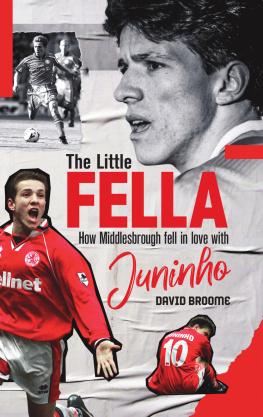Brian Broome - Punch Me Up to the Gods
Here you can read online Brian Broome - Punch Me Up to the Gods full text of the book (entire story) in english for free. Download pdf and epub, get meaning, cover and reviews about this ebook. year: 2021, publisher: HMH Books, genre: Art. Description of the work, (preface) as well as reviews are available. Best literature library LitArk.com created for fans of good reading and offers a wide selection of genres:
Romance novel
Science fiction
Adventure
Detective
Science
History
Home and family
Prose
Art
Politics
Computer
Non-fiction
Religion
Business
Children
Humor
Choose a favorite category and find really read worthwhile books. Enjoy immersion in the world of imagination, feel the emotions of the characters or learn something new for yourself, make an fascinating discovery.
- Book:Punch Me Up to the Gods
- Author:
- Publisher:HMH Books
- Genre:
- Year:2021
- Rating:5 / 5
- Favourites:Add to favourites
- Your mark:
- 100
- 1
- 2
- 3
- 4
- 5
Punch Me Up to the Gods: summary, description and annotation
We offer to read an annotation, description, summary or preface (depends on what the author of the book "Punch Me Up to the Gods" wrote himself). If you haven't found the necessary information about the book — write in the comments, we will try to find it.
Punch Me Up to the Gods — read online for free the complete book (whole text) full work
Below is the text of the book, divided by pages. System saving the place of the last page read, allows you to conveniently read the book "Punch Me Up to the Gods" online for free, without having to search again every time where you left off. Put a bookmark, and you can go to the page where you finished reading at any time.
Font size:
Interval:
Bookmark:
Copyright 2021 by Brian Broome
All rights reserved
For information about permission to reproduce selections from this book, write to or to Permissions, Houghton Mifflin Harcourt Publishing Company, 3 Park Avenue, 19th Floor, New York, New York 10016.
hmhbooks.com
Library of Congress Cataloging-in-Publication Data
Names: Broome, Brian, author.
Title: Punch me up to the gods / Brian Broome.
Description: Boston : Houghton Mifflin Harcourt, 2021.
Identifiers: LCCN 2020044745 (print) | LCCN 2020044746 (ebook) | ISBN 9780358439103 (hardcover) | ISBN 9780358449782 | ISBN 9780358449843 | ISBN 9780358439110 (ebook)
Subjects: LCSH: Broome, Brian. | African American authorsBiography. | African American gay menBiography.
Classification: LCC E185.97.B84 A3 2021 (print) | LCC E185.97.B84 (ebook) | DDC306.76/6208996073dc23
LC record available at https://lccn.loc.gov/2020044745
LC ebook record available at https://lccn.loc.gov/2020044746
Cover design by Mark Robinson
Cover image courtesy of the author
Author photograph Andy Johanson
v1.0421
We Real Cool by Gwendolyn Brooks from Selected Poems. Copyright 1963 by Gwendolyn Brooks. Reprinted by consent of Brooks Permissions.
The author has changed the names of some of the people portrayed in this book.
To Brother and Sister Outsiders everywhere.
by Yona Harvey
James Baldwins gifts as a writer were evident and well documented by the time of his memorial service in New York City on December 8, 1987. On that day, Toni Morrison, Maya Angelou, and Amiri Baraka went on record to convey how Baldwin, as a man and as an artist, made them feel. Each of these legendary writers exalted Baldwin in their own way; but the common thread was one of feeling loved by Baldwin, of loving Baldwin as their brother, and, most essentially, of being seen by him. Baldwin, after all, was a mirror for Black artists, for Black intelligentsia, and for the everyday Black American experiences that would inspire generations to come. Morrison said in her tribute, which was excerpted later that month in the New York Times Book Review, I have been seeing the world through your eyes for so long, I believed that clear, clear view was my own.
Indeed, Baldwins vision impacted not only Morrison, but countless others who recognized themselves and their struggles in Baldwins language. We all react to and, to whatever extent, become what that eye sees, Baldwin wrote in Freaks and the American Ideal of Manhood, for Playboy magazine in 1985. This judgment, he continued, begins in the eyes of ones parents (the crucial, the definitive, the all-but-everlasting judgment), and so we move, in the vast and claustrophobic gallery of Others, on up or down the line, to the eye of ones enemy or ones friend or ones lover. The fear of judgment Baldwin named is older than the Bible. Brian Broomes debut memoir, Punch Me Up to the Gods, brought this fear to the surface in riveting detail. I recognized in this book Broomes ability to hone that dreadful eying of our nonconformist behaviors, which were maligned as flawed and erroneouswhether wanting to stay inside and read rather than go outside and play, preferring dolls to trucks (or vice versa), or the genuine inability to behave as others insisted we do. This predicament was especially tough for those of us who knew our disobedience would have consequences ranging from the minorour favorite things taken away for a periodto the majorbeing bullied, physically or verbally abused, or, in some instances, being kicked out of the house. Punch Me Up to the Gods reminded me that Baldwins vast and claustrophobic gallery of Others was not often comprised of strangers, but of people in close proximity whose affections we coveted, of people who, for better or worse, we envied, admired, desired, relied upon, and frequently loved. We wanted to be loved beyond judgment, without having to conform. With tenderness, devilish wit, and the most gorgeous prose this side of the Ohio River, Broome renders these relational complexities as persistent and grounded, with few escape hatches, which make them difficult to dismiss.
As adults, the gallerys composition may change, but complex ideas of intersectionality, politics, race, gender, and identity risk being misunderstood, distorted, and outright falsifiedeven among artists. Even in chosen families, relationships can feel euphoric and everlasting at one point, only to feel combatant and fleeting in another. Consider James Baldwin and Richard Wright or Ishmael Reed and Amiri Baraka. Consider visual artist Faith Ringgolds infamous critique of her daughter Michele Wallaces book Black Macho and the Myth of the Superwoman and every Black critic and writer who weighed in on that intergenerational debate. Punch Me Up to the Gods reminded me that sometimes the trouble has less to do with the truthfulness of our multidimensional narratives, and more to do with who pays what for speaking, as Audre Lorde put it.
Reading Punch Me Up to the Gods revealed that my concerns about judgment were also about nagging doubts and insecurities, Baldwins all-but-everlasting hang-ups and imperfections, which Id rather not expose publicly. As a young college student in the mid-to-late nineties, I must have absorbed some of the vitriol and backlash against memoir writing. I certainly recall being a poet in an MFA program, attending writers conferences, and hearing disparaging words spoken about the so-called sham of creative nonfiction threatening the livelihoods of real writers and criticizing the genres godfather, Lee Gutkind. People hated the word creative, Im guessing, because it implied for them something untrue or invented. The nineties did not seem to me a great time for folks to be all up in their feelings. Luckily, lasting literature has a way of bending time.
Punch Me Up to the Gods does this. Broomes unsentimental, unapologetic recollections of the pastsome of them cringeworthyliberate us to view our pasts as well. He is not a self-help or tour guide, but someone offering a portal to his hometown. Broome doesnt aim to coerce or convince us of anything. It is as if I was there too. But I have room to process for myselfwithout intrusion, without judgment. Reading this memoir was more like listening to Broomes stories on a drive in the dark in which the conversation ebbed and flowed, high and low. He revealed one disappointment or another and then, like a seasoned stand-up comedian, delivered the anodyne punch line, which made me think as much as laugh.
Broome doesnt wait for the materialization of the perfect self, whichspoiler alertnever happens. Punch Me Up to the Gods unearths the mysteries of Broomes longings and perceived shortcomingsthe need to be accepted, to be loved, and to feel desired persists. Its that persistence, that sense of ongoingness that carried me page after page, like a good friend will do, leading with candor, sidesplitting humor, and charm. Its that ongoingness which made space for contradiction and error. Writing openly about growing up dark-skinned in Warren, Ohio, and feeling at odds with his body, Broome opens the door to overlooked vulnerabilities, to a conversation about the hurts of colorism that seemed less prevalent in literature authored by Black men. If Im a work-in-progress, it seems to say, then who am I to judge? Ill make space for you. It says the damaging slights and wounds of racial discrimination, family secrets, and heartbreak need not be overcome completely in a single, tidy narrative. What a relief. Because would we even trust a book that claimed to do that?
In his foreword to Romare Bearden: His Life and Art,
Font size:
Interval:
Bookmark:
Similar books «Punch Me Up to the Gods»
Look at similar books to Punch Me Up to the Gods. We have selected literature similar in name and meaning in the hope of providing readers with more options to find new, interesting, not yet read works.
Discussion, reviews of the book Punch Me Up to the Gods and just readers' own opinions. Leave your comments, write what you think about the work, its meaning or the main characters. Specify what exactly you liked and what you didn't like, and why you think so.

